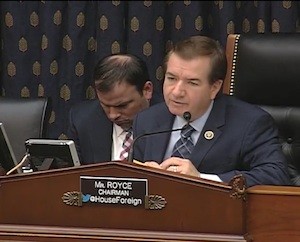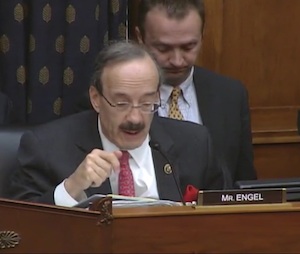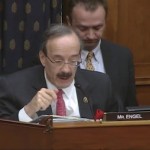BBG Watch Commentary
 Washington, D.C. – U.S. Rep. Ed Royce (R-CA), Chairman of the House Foreign Affairs Committee, convened Wednesday “a hearing to examine Russia’s use of media to destabilize Ukraine, Eastern Europe and beyond, and the U.S. government’s inability to respond effectively,” a committee press release announced.
Washington, D.C. – U.S. Rep. Ed Royce (R-CA), Chairman of the House Foreign Affairs Committee, convened Wednesday “a hearing to examine Russia’s use of media to destabilize Ukraine, Eastern Europe and beyond, and the U.S. government’s inability to respond effectively,” a committee press release announced.
The hearing, entitled “Confronting Russia’s Weaponization of Information,” included as witnesses: Peter Pomerantsev, a senior fellow at the Legatum Institute, Helle C. Dale, a senior fellow for public diplomacy at the Heritage Foundation, and Elizabeth Wahl, a former RT TV anchor who resigned on the air from Russia’s state broadcaster in protest against RT’s propaganda.
Rep. Royce said that the agency expected to manage U.S. response to Kremlin propaganda and disinformation – the Broadcasting Board of Governors (BBG) – “is far behind.”
Rep. Royce said that after just four months, a joint Voice of America (VOA) and Radio Free Europe / Radio Liberty (RFE/RL) 30 min. Russian language television program “was pulled in Latvia because it couldn’t draw an audience.” We were trying to independently verify this information.
Rep. Royce said that “this isn’t a matter of resources. U.S.-broadcasters are laboring under a flawed bureaucracy.”
REP. ED ROYCE: “…they hired a CEO and he quit after 42 days on the job. Last week, the director of the VOA announced his resignation. Our international broadcasting is in disarray.”
 Ranking Democrat on the House Committee on Foreign Affairs, Rep. Eliot Engel (D-NY), said that the Obama Administration is working on solving problems associated with U.S. international media outreach:
Ranking Democrat on the House Committee on Foreign Affairs, Rep. Eliot Engel (D-NY), said that the Obama Administration is working on solving problems associated with U.S. international media outreach:
REP. ELIOT ENGEL: “I’ve been told that our State Department is now working full-tilt toward a plan to address this problem. This can’t come soon enough. We’re eager to work with the Administration to develop this plan and set it in motion, because the United States has a major role to play.”
Peter Pomerantsev said that “it is important for the USG to realize that the 21st century will be defined by new forms of information conflict. A comprehensive approach is urgently needed to deal with this- the West, including the US, is behind the curve.”
Helle Dale described a 2012 incident at the Voice of America in which she was involved. It was self-censorship of a program to Russia imposed on VOA journalists by the management.
HELLE DALE: “In one case I personally recall, I had been invited to participate in a VOA foreign policy discussion on an English language program. The program has a global audience and is not aimed specifically at Russian listeners. But it was contracted to be rebroadcast in Russia by Voice of Russia, a state owned service. It was right before the Russian presidential election in March, 2012, and the election would have been an obvious topic for discussion. However, in a particularly shocking example of self-censorship as a consequence of foreign pressure, employees of Voice of America were told by VOA managers to cancel plans for coverage of the Russian presidential election on the day prior to and the day of the Russian vote. The reason? Voice of Russia was threatening to tear up its rebroadcasting agreement with the BBG unless the U.S. government’s broadcasters complied with limitations on election coverage imposed by Russian legislation. Russian demands were meekly accepted by the same VOA management that fiercely resists any interference from the U.S. government in the name of editorial independence.”
Former RT anchor Elizabeth Wahl said that “conspiracy theories are given a platform at the channel, along with guests with viewpoints that range from unconventional to deranged.” Speaking about Russia’s military intervention in Crimea and eastern Ukraine, she noted that “through denial, deception, omission of critical facts, conspiracy theories, and outright lies, Russia was able to shape reality or at least make it difficult to find out what the reality is.”
Elizabeth Wahl also noted that those who expose Putin’s propaganda are subject to attacks by the Kremlin’s supporters.
ELIZABETH WAHL: “Those that challenge any narrative against Russia are branded CIA agents, of being puppets for neo-conservatives intent on reigniting a cold war, and face the ire of seemingly countless online trolls or hecklers on the internet that hijack online discussions. I was accused of being all of these things and faced the constant stream of Internet hate for being perceived as such. This is just a minor example of this new propaganda technique in action.”
Videos and statements from today’s hearing can be accessed HERE.
Chairman Royce also penned an op-ed in today’s Wall Street Journal entitled “Countering Putin’s Information Weapons of War.”
BBG Watch is also reposting the opening statement from Rep. Eliot L. Engel (NY), the leading Democrat on the House Committee on Foreign Affairs.
Some former and current VOA English newsroom reporters and managers expressed strong reservations about the language in last year’s bipartisan bill to reform the BBG, H.R. 4490. The bill won unanimous approval from the House Foreign Affairs Committee and the House of Representatives, but it was not voted on in the Senate in 2014. It must be reintroduced and passed by both houses of Congress and signed by the President to become law.
Al Pessin, a VOA foreign correspondent, criticized the original bill in his The Los Angeles Times op-ed, “Back off, Congress, and keep Voice of America real.”
While the title of the op-ed was probably chosen by the editorial staff, the author, who represented only himself, kept referring to the bill as “the Royce bill,” even though the legislation was fully bipartisan. It was introduced in 2014 by both Chairman Royce and Ranking Foreign Affairs Committee member Rep. Eliot Engel (D-NY).
There seems to be a general agreement among most if not all House Foreign Affairs Committee members and Broadcasting Board of Governors members that propaganda is not the answer to RT’s propaganda. There seems to be less consensus on what should be the link, if any, between the BBG, the Voice of America and the U.S. foreign policy establishment. Some Voice of America newsroom correspondents were strongly opposed to the language in H.R. 4490 that VOA should “promote” U.S. foreign policy.
In July 2014, Voice of America reported on the controversy over the bill’s language.
VOA NEWS: “Some current and former VOA journalists say they agree that changes to management are urgently needed, but they are worried about language in the House bill that calls on the Voice of America to promote U.S. foreign policy while being a fair and accurate source of news. The bill also would reduce the scope of VOA’s coverage from world news to U.S. news and policy.
Former VOA deputy director Alan Heil says those changes would be devastating:
‘If that bill becomes law, VOA’s worldwide following on radio, TV and online channels would plummet precipitously. The Voice’s greatest asset, its credibility, would be in shreds,’ said Heil.”
Rep. Engel strongly denied that the Congress wants to turn the Voice of America into a propaganda tool of the U.S. government.
Despite reservations about some of the language in H.R. 4490, the union representing Voice of America and other BBG federal employees, AFGE Local 1812, expressed strong support for the bill because of its management reforms provisions.
A broad coalition of former members of the Broadcasting Board of Governors, journalists, and former BBG employees sent an open letter to President Obama expressing support for H.R. 4490 management reform provisions and for the VOA Charter.
Broadcasting Board of Governors chairman Jeff Shell said in a recent meeting with employees that Rep. Ed Royce cares about U.S. international media outreach and is a good man, but in order to get the reform legislation passed he must stress what is wrong with the agency rather than what VOA and other journalists are doing right. Shell said that the agency needs new legislation to strengthen the role of its CEO. Shell is believed to favor having only one board and one CEO.
The White House and the State Department also appear to have some reservations about Chairman Royce’s proposal to have two boards and two top executives in charge of the federal and the non-federal components of the agency.
The board under Jeff Shell’s chairmanship has initiated some internal reforms.
At a meeting with employees at the Voice of America in Washington last week, VOA Director David Ensor announced that he submitted his resignation to the Broadcasting Board of Governors and wants to leave by end of May. Well-informed sources told BBG Watch that a permanent replacement for David Ensor is not likely to be named until the federal agency in charge of VOA and other U.S. taxpayer-funded media organizations serving audiences abroad also has a new permanent CEO. First BBG CEO Andy Lack had left earlier this year after only a few weeks on the job.
Chairman Royce Opening Statement
As prepared for delivery.REP. ED ROYCE: Today we look at the danger of Russia’s misinformation campaign in Europe – indeed, around the world – and the failed U.S. response.
As we will hear today, Russia’s propaganda machine is in overdrive, working to subvert democratic stability and foment violence in Eastern Europe. These tactics have undermined the government in Ukraine, laying the groundwork for invasion. This same plan is being worked in Eastern and Central Europe. Russian propaganda has the potential to destabilize NATO members, impacting our security commitments. This Russian campaign –what one witness describes as the “weaponization of information”– seriously threatens U.S. security.
Russia has deployed an information army inside television, radio and newspapers throughout Europe. Some doing the Kremlin’s bidding are given explicit guidelines to obscure the truth by spreading conspiracies that the CIA is responsible for everything from 9/11 to the downing of Malaysia flight MH17 over Ukraine. Others are simply paid more for demonizing the West, while those who pursue credible reporting are pushed aside. Today we will hear from journalist Liz Wahl, who dramatically interrupted a live broadcast to resign from RT, a Russian outlet, explaining she could not stand by its distorted coverage of Russia’s occupation of Ukraine. Meanwhile, independent journalists in Russia have come under attack, with three killed so far this year.
Unfortunately, Ms. Wahl is a rarity, so Russian speakers in the frontline states like the Baltics, Ukraine, and Moldova continue to be told that their governments want to oppress and render them second-class citizens. Unfortunately, many are buying this divisive message. In parts of Europe where there aren’t Russian speaker populations, the message is that western democracy is morally corrupt and that integration with Europe since the Cold War has failed. It’s estimated that Putin is spending more than $600 million a year to deride democratic pluralism.
And the U.S. response? The agency expected to manage our response – the Broadcasting Board of Governors (BBG) – is far behind. After years of Russia ramping up its effort, last fall, the BBG finally launched its flagship response to Russian propaganda – a mere 30-minute television news program in the Russian language called “Current Time.” The program was put on-air in Lithuania, Moldova, Georgia, Ukraine, and Latvia. But after just four months, it was pulled in Latvia because it couldn’t draw an audience. What U.S.-backed news and information that does get through is a thimble of journalistic credibility in an ocean of Russian-driven news distortion.
This isn’t a matter of resources. U.S.-broadcasters are laboring under a flawed bureaucracy. Members may recall that then-Secretary Clinton called the agency “defunct” in her testimony before this Committee in 2013. The Inspector General and Government Accountability Office have been highly critical. Defenders have argued that all the BBG really needed to improve was a new CEO. Well, they hired a CEO and he quit after 42 days on the job. Last week, the director of the VOA announced his resignation. Our international broadcasting is in disarray.
The journalists of the BBG risk their lives reporting from the frontlines across the world. They deserve better support. And the American people need much more from this agency if we’re going to respond to the rapidly evolving media environment and better secure the long-term security interests of the United States.
Last Congress, the House unanimously passed bipartisan legislation introduced by myself and Ranking Member Engel. That legislation will help us fight Putin’s propaganda by allowing more resources to be spent in the field and on content instead of a broken bureaucracy. By clarifying the BBG’s mission, creating accountable leadership through a CEO, and reducing the bureaucracy more of the budget can be spent on disseminating truthful news. Righting international broadcasting must be an urgent priority in our foreign policy.
###
ENGEL OPENING STATEMENT AT RUSSIA HEARING
Wednesday, April 15, 2015
– As Delivered –
WASHINGTON, DC—Representative Eliot L. Engel, the leading Democrat on the House Committee on Foreign Affairs, today delivered the following statement at a Committee hearing on Russia’s weaponization of information.
“Thank you very much Mr. Chairman. Thank you for calling this morning’s hearing and I especially want to thank you for your leadership as this Committee works to address the growing Russian threat. You’ve really been right on top of it. I really appreciate it and it’s just so important. Thank you for your courage and for your voice, it has been a pleasure to be a partner.
“Let me also thank our witnesses today for sharing your expertise about a major part of that threat: Russia’s new and intensified propaganda effort.
“It’s long past due that we take a hard look at this challenge. The Kremlin’s disorientation campaign goes beyond political spin and disinformation. What we see pouring out of the Kremlin amounts to the ‘weaponization’ of information.
“Propaganda is a critical element of Russia’s so-called hybrid warfare strategy—a strategy on devastating display in occupied Crimea and war-torn Eastern Ukraine. Coupled with cyberattacks and other covert operations, these new capabilities and Vladimir Putin’s belligerence pose a direct threat to our allies and our interests.
“These measures are well financed. These measures are working. And these measures demand a robust response from us.
“Kremlin-controlled media are putting down roots around the world. Russian financial support is bolstering fringe political parties, creating puppet NGOs, and fostering a facade of academic research sympathetic to Vladimir Putin’s anti-democratic worldview.
“The Kremlin aims to undermine democratic organizations and alliances. Russia’s leaders want to divide allies and partners while seeking to discredit the post-Cold War order in Europe. This strategy is not just to disseminate lies, but to sow doubt and confusion, especially about what is actually and really happening in Ukraine.
“The component of this propaganda war that concerns me most is the influx of Kremlin-controlled television broadcasts in front-line states. From the Baltics to Central Asia, a Russian-speaking population of nearly 100 million people is getting its news from such distorted broadcasts. Here, the Kremlin uses high quality entertainment to draw an audience, then interlaces that programming with their twisted and false perspective on political, military, and economic events.
“Today, I hope we can hear more about Russia’s propaganda campaign, and more importantly, what we can do to push back against it. We cannot match the hundreds of millions of dollars the Kremlin is plowing into this effort. Instead, we must look to creative thinking and broad-based partnerships.
“Given the scale of the Kremlin efforts, it’s clear to me that traditional public affairs and public diplomacy—while important parts of a broader effort—do not go far enough.
“We’ve seen some promising initiatives. For instance, the Governments of Latvia and Estonia are developing a plan to launch Russian-language television networks in their respective countries. They want to create a platform for content-sharing and establish a fund for the production of locally focused content. Additionally, we anticipate a feasibility study this spring from the European Endowment for Democracy recommending a similar approach.
“But Mr. Chairman, as you recognized, the United States needs its own strategy to deal with this, and we need it now.
“I’ve been told that our State Department is now working full-tilt toward a plan to address this problem. This can’t come soon enough. We’re eager to work with the Administration to develop this plan and set it in motion, because the United States has a major role to play.
“In my view, the United States is in a unique position to convene partners from the private sector that will be essential for the success of such initiatives. Furthermore, U.S. leadership will be necessary to ensuring that reluctant Western European allies understand and appreciate the risks posed by an unchecked Kremlin propaganda campaign.
“One thing is clear: meeting this challenge will certainly not be easy. A non-democratic government in Russia is able to devote nearly limitless resources to spreading lies and sowing confusion, disinformation, and division. But the stakes are high, and acting sooner rather than later will make a daunting task a little easier and much more effective over the long run.
“I look forward to hearing our witness’s views on this challenge, and their ideas about how we’re going to deal with it.
“So, thank you again, Mr. Chairman, for calling this hearing.”
###

